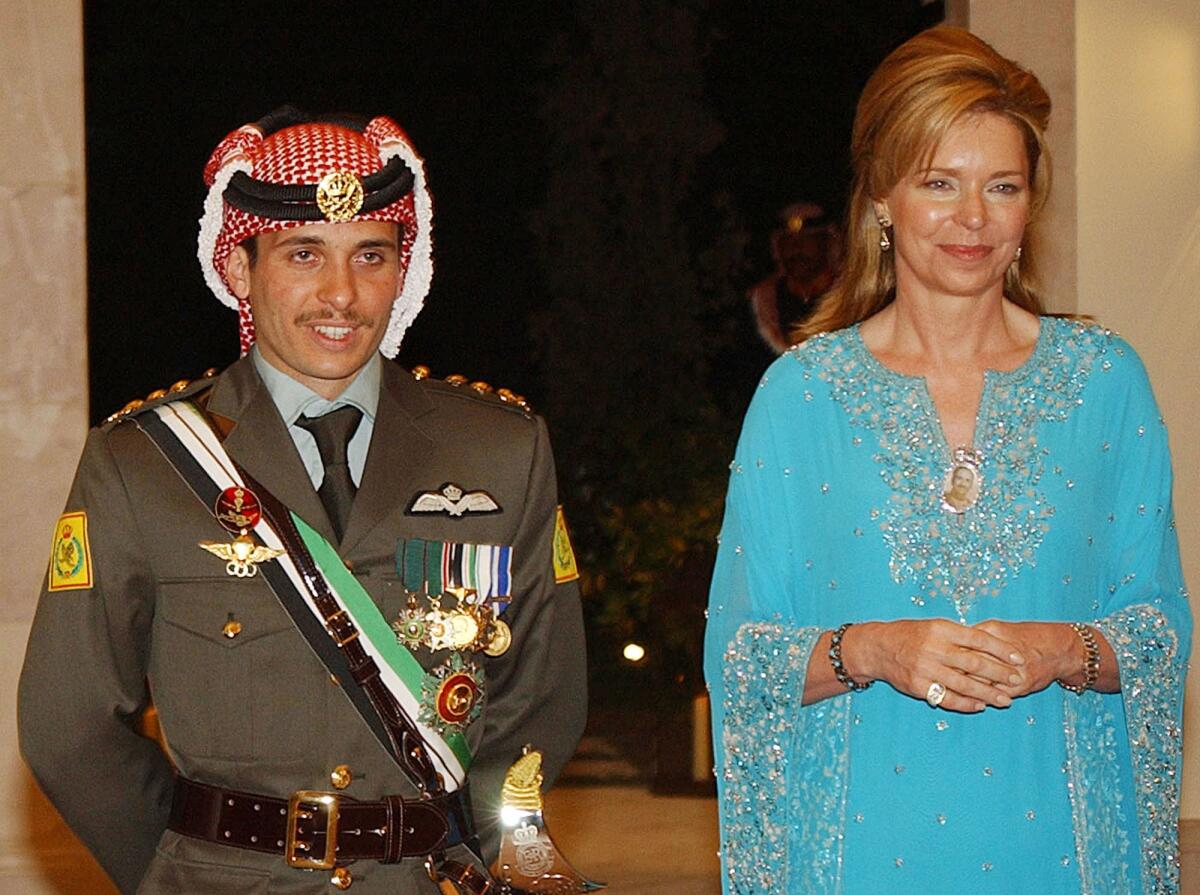Jordan’s former crown prince accused of targeting kingdom’s stability

- Share via
AMMAN, Jordan — A top Jordanian official Sunday accused the kingdom’s former crown prince of colluding with outside parties in a plot aimed at targeting the government’s security and stability, one day after the prince was placed under house arrest and security forces detained more than a dozen of his associates.
Ayman Safadi, who serves as both Jordan’s deputy prime minister and foreign minister, said in a press briefing on Sunday that lengthy and vigorous investigations by the army and intelligence services had uncovered questionable “activities and movements” by Prince Hamzah bin Hussein, the 41-year-old half brother of Jordan’s King Abdullah II. Hamzah, who issued a scathing public denunciation of the government Saturday after being told not to leave home, was removed as crown prince in 2004 by Abdullah, who installed his eldest son, Hussein.
Those activities, Safadi said, included the incitement of prominent figures at home as well as conferring with foreign entities abroad “regarding the most suitable time to commence steps to shake the security of our defiant Jordan.”
The fast-moving developments have shocked Jordanians unused to the sort of palace intrigue that has often plagued neighboring countries. After a night of fevered speculation of a wide-ranging coup attempt, the country woke up to an un-coup-like start of the week, with Safadi never using the word coup in his remarks and a routine security presence in most parts of the capital and major cities. Jordan, a resource-poor desert kingdom slightly smaller than Maine, retains outsize importance because of its reputation for stability. It is bordered by Israel, Syria, Iraq and Saudi Arabia.
“We confirm here that there is now full control over these movements … and the state services were able to smother them before they began,” Safadi said. “The security of Jordan is stable and steadfast with the awareness of our defiant people, the wisdom of the king and the dedication of our security services.”
Sunday’s briefing capped a dramatic moment, but it brought little clarity to what exactly transpired over the weekend when security services arrested almost 20 people, including high-ranking government officials and a relative of the royal family. Prince Hamzah, the army’s chief of staff said on Saturday, had not been arrested but was asked to limit his movements. Instead, he broadcast two videos late Saturday in which he said his communications were being cut and he excoriated the king and his circle over what he said was corruption, nepotism and an inability to tolerate dissent.
“It has reached the point where no one is able to speak or express an opinion on anything without being bullied, arrested, harassed and threatened,” he said in his English-language video broadcast by the BBC on Saturday.
He added that he expected the government to accuse him of being part of an outside plot.
“I am making this recording to make it clear that I’m not part of any conspiracy or nefarious organization or foreign-backed group as is always the claim here for anyone who speaks out,” he said.
Safadi declined on Sunday to identify the foreign parties he said were involved, but declared that their “sinful plans” were aimed to “weaken Jordan’s position regarding primary issues in the region.”
He also did not elaborate on what those issues were, but as evidence of a foreign connection, he said “someone with links to foreign security services” had offered to put a plane under the disposal of Hamzah’s wife to spirit her and his children to a foreign country.
“This represents another indicator of the implication of outside groups in suspicious activities that were thwarted to protect Jordan and its stability,” he said.
Activists on social media later identified the person as Roy Shaposhnik, an Israeli national who — according to his LinkedIn and Facebook pages — had served as a captain in the Israeli army but is now based in Europe with a company named Global Mission Support Services. He has also worked with Erik Prince, the notorious U.S. mercenary boss. (Shaposhnik later confirmed to Israeli journalist Barak Ravid that he had offered to send Hamzah’s wife and kids to his home in his capacity as a “close personal friend.”)
Safadi on Sunday painted the prince as a frustrated royal clamoring for power who has been duped by Jordan’s enemies into working against the state — an image at odds with the prince’s public persona. The eldest son of King Hussein’s fourth marriage, to Queen Noor (nee Lisa Halaby), Hamzah was considered his father’s favorite, and is close to the tribes that traditionally were the monarchy’s power base.
“What I will say is that two aims coincided. One aim for people executing agendas to shake Jordan’s stability,” Safadi said. The other, he added, involved “illusions and ambitions.”
He added that when presented with the investigation’s results, the king had initially opted to speak to the prince directly and deal with the situation as an internal family matter.
“But at the end, the security and stability of Jordan are above all consideration and all the necessary legal procedures will be taken to protect them,” Safadi said.
In the aftermath of Saturday’s detentions, Arab and regional countries sent messages in support of Abdullah and any moves he had taken to maintain security. That included Israel, which signed a peace treaty with its neighbor in 1994. Israeli Defense Minister Benny Gantz, speaking after the detentions, described Jordan as a “strategic ally.”
More to Read
Sign up for Essential California
The most important California stories and recommendations in your inbox every morning.
You may occasionally receive promotional content from the Los Angeles Times.














